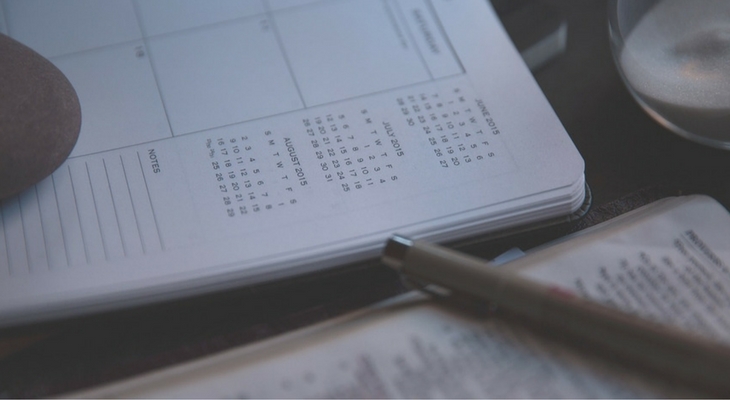8 Effective Ways to Beat Exam Anxiety Once and for All
Test-taking anxiety is a common and debilitating problem. We know, it’s frustrating to hit the books for so long and so hard, only to underperform because your nerves got the best of you. Don’t fret! Here are 8 tips for reducing exam anxiety today, tomorrow and forever.
Updated 16 May 2019

It’s the morning of The Day. In less than an hour, you’ll be sitting for an exam where the results will account for fifty percent of your final grade. You feel like (a) throwing up; (b) beating yourself for not studying enough; (c) hollering for your mother; (d) all of the above.
If you feel like any of the above, you’re not alone. With clammy hands and edginess, you have a fear of impending academic doom that is (trust us) shared by a mass of students.
How can you keep your stomach from doing flips? How can you recall all those names, dates and theorems that are playing hide-and-seek in your brain? Relax.
A certain level of nervousness associated with taking a high-stakes examination is normal, and it’s not for the worst if you play it to your advantage. Ahead of the big day itself, here’s our meticulously crafted guide of do’s and don’ts, before and during a nerve-wracking exam to help reduce your anxiety!
Before Test Day
Prepping yourself for an exam is akin to an athlete preparing for a major event. Not only do you need to commit yourself and think positively about it, you also need to actively prepare for it.
#1. Curate a plan for yourself

This may not hit you as breaking news but what is shocking is the amount of students who brush off the perks of curating a personal study plan.
Here’s why – (1) it gears you with the achievements to tick off as you approach your test date; (2) instead of being overwhelmed by how you will ever scale that towering mountain, you can point to a trail and baby-step your way; and (3) you can track and understand your learning progress.
Kick start by pinning down the chunks of the test that frustrate your nerves the most, and work out a plan to address each area before exam day. Break up the material that you must master in sections and schedule a time to run through it bit by bit.
PRO TIP
If you are tech savvy and despise paper and pen, here’s a free online study planner to force help you align your goals with your day-to-day study routine.
#2. Educate yourself a.k.a study more, like a lot more

Yes, this seems like a no-brainer, but it bears repeating (#nottryingtobeamom). A reality that most students who struggle with exams conveniently fail to grasp is the fact that they just have not studied enough. Not surprisingly, insufficient study time is often the chief contributor to exam anxiety.
If you suffer from exam jitters, first get down with the nuts and bolts of the exam. The more you familiarise yourself with the impending hurdles, the more you can knuckle down on strategies that will help you perform your best. If you struggle with reviewing tough concepts or if you are weak in certain types of questions, you know you’ll have to pour in the extra sweat.
PRO TIP
Scrutinise all the details of the actual test, from the location of the exam hall, duration of the test, down to the materials that you will need. Answering all these questions in advance will calm your nerves and scale down other uncertainties surrounding the exam.
#3. Give your mind some space

Conquer the kiasuness inside you and catch a breath whenever you need to break the tension! Practising some form of meditation or deliberate relaxation can pave a way in helping you take charge of your breathing, heart rate and thought process.
Focus your drill on calming yourself by washing off unwanted thoughts, refocusing your mind and controlling your breathing. Trust us, it is worth every drop of your perspiration to maintain such a habit over time. What you will uncover is that focusing on your breathing to bring about calm begins to happen instinctively when you feel anxious.
PRO TIP
Close your eyes and start to breathe slowly and easily. Be sure to use deep diaphragmatic breathing. This type of breathing lends a hand in soothing your nervous system and toning down anxiety. Allow every breath you take to increase your confidence and intention to perform well on exams.

#4. Get rid of the monsters inside your head

For starters, the desire to steer clear of failure is a very poor motivator. To deceive prep yourself for success, you must acquire the knack of expelling negative thoughts. Believing that you are judged - by friends or family - solely on your academic achievements will amplify the balloon of pressure you feel about assessments and examinations.
The pitfall? You’ll begin to hinge on your academic achievements alone for self-esteem or to feel worthy of being liked or loved. Feeling fearful and anxious will make things worse and wind down your ability to perform well. Frozen by your fears, the high dose of anxiety can thwart you from prevailing with productivity and efficiency.
Start by jotting down your thoughts and responses to situations that make you feel anxious. Pin down your anxiety triggers and pen down a positive response to each negative statement and belief you’ve inscribed. It may also be worth taking the time to mull over what you value in others - is it their academic achievement? - and then reflect it upon yourself.
Apply for university with EduAdvisor
Secure scholarships and more when you apply to any of our 100+ partner universities.
Start now#5. Let procrastination off the hook

How often do you pledge to wrap up an important task only to put it off? Let’s face it: when your nerves are driving you up the wall, odds are, you’re likely to fall into the deadly trap of procrastination. But don’t blame yourself just yet!
With affirmations from our fellow psychologists, you can stop beating yourself up because procrastinations has been noted as a fear-based response, rather than one rooted in laziness. For instance, if you find yourself procrastinating on a writing project, it’s likely that you are not lazy. Instead, you could be afraid that your work will be terrible.
So the first step is to pause, and a shine a light on the lurking fear. We tend to avoid this, but don’t. Take a good look at the fear, and be honest with yourself: why are you avoiding this task? What are you afraid of?
Now ask if there’s a reason you think you’ll do badly or if you’ve failed at this kind of task a lot before. It is possible that the fear is groundless. Tackling on what you fear as well as understanding your own struggles and motivations could grant you the power to zap the procrastination bug.
#6. Feed your mind

“What’s for dinner?”
As a mundane question that we often throw at each other, the taxing riddle has also now arrived at the doorstep of an unexpected place – the psychiatrist’s office. Yes, a growing research is now pointing that a nutritious diet isn’t just great for the body, it’s gold for the brain too!
What appears to be less common is an understanding that certain foods can stamp an enduring influence on our mood and mental wellbeing. For starters, there are four neurotransmitters - acetylcholine, serotonin, dopamine/adrenaline/noradrenaline and 4-aminobutyrate (GABA) - that are particularly vital for good mental health as they directly tickle with our feelings of contentment and anxiety, memory as well as cognitive function.
GABA has particularly been shown to be highly effective in combating anxiety. So look out for foods that are loaded with GABA such as dark green vegetables, seeds and nuts, potatoes, bananas as well as eggs.
On Test Day
#7. Keep calm and prime your brain

Resist the Asian in you and don’t study. If you’ve studied well before hand, you shouldn’t need to study on exam day. A brief skim through would be helpful to jog your memory but anything beyond that will not only make yourself anxious, you also won’t be able to absorb any new information.
Prime your brain – be very mindful not only about what you consume but also on your thoughts. For a couple of hours prior to the test, stay away from heavy meals because your body may focus more energy on digestion than on thinking. You wouldn’t want your digestive system to be competing with your brain for oxygen-rich blood.
PRO TIP
Staying hungry won’t help either. If you must, sample some of these brain foods one or two hours before your test.

#8. Paint a picture of success

As cliché as it may sound, visualisation works wonders because it generates an alternative narrative. By utilising the power of imagination, you are creating a story that you will live out.
Ditch narrating a vague imagination like “I will do great!”. Instead, put your mind to the emotions you want your future self to experience: your grit and fire as you set out for the test, your jitters as you set foot into the exam hall, your satisfaction as you successfully nail one question after another and the liberation when you are done.
PRO TIP
Start practising with low-stakes scenarios (such as your weekly quizzes or mini tests) and by the time your exam rolls in, you’ll be living a story that you have already written.
For most of you out there, putting this two-part plan into action will go a long way in taming your nerves. Some students, however, may find their anxiety is grounded more deeply and harder to relieve. If your anxiety is too severe for you to handle, it’s important for you to seek help. Your school’s counselling stop is a great place to start.
Above all, remember to maintain perspective. Even if the worst case scenario somehow occurs, you will survive and you will find a path forward. Make a plan, stick to it and think positive thoughts.
May the force be with you. Now go out and own it!






